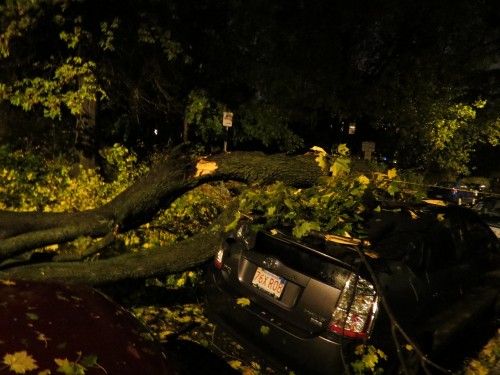EDITOR NOTE: Congratulations to Jonny, this is his 50th post on Technology Bloggers! Feel free to thank him for his fantastic contribution to the blog with a comment 🙂 – note by Christopher
This is my 50th post and I am very pleased, so once again I would like to try to propose something a little different.
This week I have experienced my second hurricane, Sandy passed through Boston where I currently reside, tearing up trees, bringing down power lines and bucketing tons of water upon us. The disaster seen in New York was not replicated here, but we are still in a state of emergency with millions of people without power.
One interesting aspect about the whole affair was watching the state prepare for something that it could not really fully understand. The authorities did not know where the hurricane would hit land, or how much damage it would do. They had to rely on scientists’ models and experience to make plans and try to save lives and limit damage.
Which all brings me on to the topic for today’s post, scientific advice.
Another disaster is in the news this week from my other home country, Italy. 6 of Italy’s leading scientists and one ex government official have received prison terms for offering falsely reassuring advice immediately before the 2009 Aquila earthquake. They were each found guilty on multiple counts of manslaughter after more than 300 people died in the catastrophe. The BBC has a short article on the proceedings and sentence here.
All members of the National Commission for the Forecast and Prevention of Major Risks, they were accused of having provided “inaccurate, incomplete and contradictory” information about the danger of the tremors felt ahead of the quake. There had been a series of smaller tremors in the weeks and months preceding the larger one on 6th April, but the Commission had suggested that this did not mean that a larger quake was on its way.
They were wrong however, but many members of the scientific community have come to their defense, stating that earthquakes are inherently unpredictable, technology does not allow accurate prediction, and that a series of tremors such as those seen in Aquila only lead to a major quake on about 1% of occasions.
The Scientists found guilty are amongst the most respected geologists and seismologists in Italy, and this leads me to ask several questions. Who can we ask for advice in order to prepare for disasters if the best scientists are not able to provide the answers? What effect will this ruling have upon the scientific community and their willingness to give advice on such matters? Can we hold scientists responsible for such events? What effect does politics have on their decision making and advice to the public?
Here during hurricane Sandy several local government officials were criticized for not implementing evacuation procedures that were called for by central government upon advice given by scientists, and I would ask if the fact that there was loss of life might have been avoided. We all knew it was coming!
These points above could also be made about other problems, the obvious one being climate change. There are several articles on this website that address this issue including my own ‘Health of the Planet‘ series, but once more the entire subject is bogged down with political versus scientific arguments.
We are talking about risk here, and risk is not an easy thing to assess or to communicate. The Aquila scientists may argue that the 1% risk is minimal after a series of smaller shocks, but the risk may also be greatly magnified from a starting point of no shocks. A great deal is in the phrasing, and phrasing may be political.
Last year, here in Cambridge Massachusetts, I interviewed our local Congressman, Michael Capuano on the problems of making political decisions regarding science, and you can see a transcription here if you like. It makes for interesting reading.



